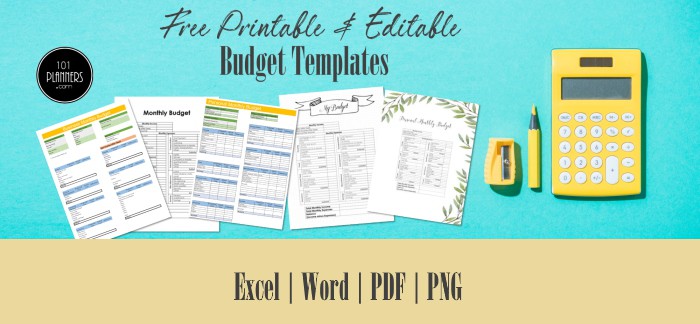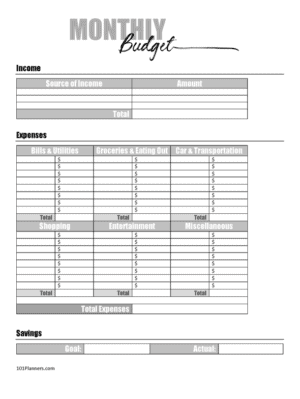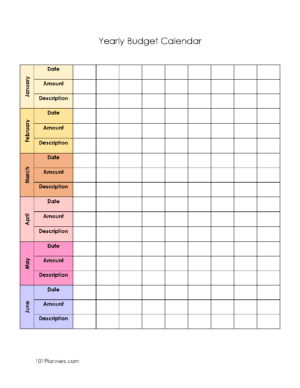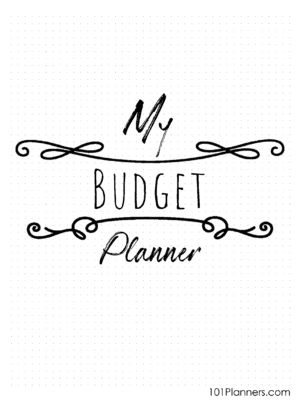
Free budget sheet template you can customize to suit your needs for business and personal use. It will help you track your income and expenses so that you can manage your budget effectively. Managing your money can be easy!

Select a budget tracker printable from the selection below. There are many different formats and layouts. Select one that is closest to the format you want. Each budget spreadsheet template is totally customizable and editable. If you found everything you want, then you can stop here.
If you need to edit it, then add lines or cells. It is much easier to edit an existing template than to start from scratch.
Use our free monthly budget template to calculate your expenses and income over a one-month period. You can print 12 copies and make a DIY budget book for an entire year to create a monthly budget planner. We offer a simple monthly budget template in different formats, including Excel, Google Sheets, Word, Google Docs, PDF, or as an image.
Free printable budget planner for your home or work budget. Since the text is editable, the free budget printables can be used for any purpose. The spreadsheet includes most items in the family household budget. However, you can delete or add any items.
The Excel monthly budget template includes formulas that will calculate the totals in each section. If you don’t have or use Microsoft Excel, then you can use the monthly budget template Google Sheets format. Google Sheets is a free alternative to Microsoft Excel. It can use used online and offline. It can also be easily shared with others which is good when you are keeping track of a family budget that needs to be updated by more than one person.

This household budget template offers a structured way to track and manage your monthly finances. It includes the following:
By using this template, you can gain better control over your finances, identify your spending patterns, and make informed decisions to achieve your financial goals. It’s an excellent tool for anyone looking to improve their financial planning and budgeting habits.
See also: budget planner template with savings

The 50/30/20 rule is a budgeting tool that determines that 20% of your net income should go to savings (or debt reduction). We offer a free 50/30/20 calculator and spreadsheet to calculate your savings according to this rule. This free monthly budget template divides your monthly budget into needs/wants/savings to ensure that you are within the guidelines. It also compares your monthly budget to your actual spending.
The following budgeting templates are available in Word, typeable PDF, or as an image.
Edit the template and all text
This budget template is for weekly, fortnightly, or monthly use.


This is a simple budget template. There are 8 categories of expenses and a section for income and balance (income minus expenses).
This printable budget worksheet records income, expenses (divided into six categories), and a section for savings (goal vs actual).


I find this calendar useful to list expenses each month. It lets me know where I stand and how much will still need to pay that month on any given day before my next paycheck arrives.
This free printable budget planner will help you get a better understanding of how much money you earn, and what you spend it on, and help you improve your financial situation.

This 24-page printable budget book in PDF format has everything you need to get your finances in order and keep them there. If you prefer to select each budget printable yourself then scroll down below and print only the pages you want to include in your budget planner.
If you select each page, you will create the best budget planner book for your needs and it won’t cost you a cent! You can also just go through the ready-made book and print only the pages you want to use.
101 Backgrounds or Borders
We also offer free printable budget templates with pretty borders and backgrounds. You can use them as is or in any planner. These are two examples, but we have 101 different backgrounds and you can add additional widgets or text and images. You cannot change the template for budgeting (the table) but you can change the borders. If you want a template for a budget that you can edit and change then the Word or Excel options above are more appropriate.
This customizable monthly budget template printable can be used in a paper or digital planner. You can change the borders, titles, and colors. You can choose the budget template, but you cannot edit it. If you prefer to edit it, then select a weekly or monthly budget template in Excel or Word format.



If you prefer bullet journal style then you might prefer this home budget template. As always, with our bullet journal maker, you can add embellishments, doodles, text, etc.


This printable budget worksheet has three sections for income, expenses, and savings. If you want to change the expense categories, then the Word version will be better.
A weekly budget is useful when you get paid weekly. Since certain expenses might be paid on a monthly basis, you can either take the relative percentage of those expenses into account or set up a different budget for each week of the month.
Benefits of a Budget Planner
A budget planner will help you save money and keep you motivated and accountable during the process. There are a lot of budget planners and budgeting templates on the market, but you don’t want to spend money to save money! Therefore, we offer you free budget printables to calculate and track your income, expenses, and savings.
I love shopping and spending but hate spending more than I have, which is why I track my spending and expenses. I also feel more secure when I know I am saving enough for a rainy day and have my finances in order.
One of the first steps to controlling your personal financial situation is to create a budget and then track expenses and income to ensure that you are always on budget. Today, when things are so accessible, you can even go shopping in your pajamas at night. It can cause you to spend more than you realize you spent. Before you know it, you are in debt and in over your head. When you keep track of your expenses and income, you can ensure that you stick to your budget. A budget tracker is a great way to save. Set a goal of how much you plan to save each week or month and try to stick to it. The savings trackers will help you keep track and reach your goal.
There are many different free budget templates available. Choose the template that works best for you. The templates can be used for many purposes, such as tracking your family budget, a vacation, or a wedding budget. Since the text is editable, you can adapt any budget for any purpose.
You can make an entire budget planner by using a few of the templates. You can then track your income, expenses, budget, and specific projects. You can also set goals for savings. If you do decide to make a budget planner, then you might want to create a planner cover.
Please note that the free budget planner printables on this page are for your personal budget. If you want a template for a small business, then please see the business budget template.
A budget tracker template can help you ensure you stay on track and don’t deviate from your budget. If you do, you will at least be aware before things get out of hand.
We also offer a monthly expense tracker printable and bill tracker if you only want to track expenses without income.
![]()
Our free printable savings tracker will help you save to reach any goal from buying something small to a home. You can use it to save for a rainy day or for your children’s education.
![]()
A monthly budget calendar will keep track of your finances and help you see what your income and expenses will be each month. Use the editable calendar to plot out your paychecks, bills, and expenses each month. Some of the following templates also have a monthly budget. There is also a section to record your bills and a notes section to keep notes.

Monthly Budget Calendar
Yearly Budget Calendar

I find this calendar useful to list expenses each month. It lets me know where I stand and how much will still need to pay that month on any given day before my next paycheck arrives.
A monthly budget calendar is usually the easiest and most accurate way to track your budget. Create one page for each month to complete a year.
Once you have added all income and expenses, you will be able to see if your paycheck will be sufficient and if you will have any money left at the end of the month. If you are living from paycheck to paycheck, this will prevent any surprises that you do not have savings to cover. If you want to build an emergency fund or savings plan, you might want to try our 30-day spending challenge.
You will need to update your monthly budget calendar each month to keep it accurate. You can either print 12 months in advance or bookmark this site and come back each month.
You can use these printables as-is or insert them into your binder, Happy Planner, or any other planner with removable pages. Our free printable monthly budget template is a perfect addition to your Happy Planner. The problem is that you will need to calculate the totals which will take a little more time. Many people don’t mind this. However, if you prefer a monthly budget Excel template then you can fill it out and then print it, and insert it into your Happy Planner when it is complete.
Select any budget tracker template from the selection available above. The Google Sheets or Excel monthly budget templates are the easiest formats to use when you want to track your budget, as the spreadsheet will automatically calculate totals for you (our spreadsheets include formulas that will save you a lot of work). We offer a variety of free monthly budget templates or weekly budget templates. Select the layout that will work best for you.
Let’s go through each stage step-by-step. Open your monthly budget worksheet and let’s get started.
To track your budget you basically need to know how much is coming in and how much is going out. However, that is easier said than done. We tend to overestimate how much comes in and underestimate how much we spend.
If your salary is not set then work out your average salary for the last 6 or 12 months. Include all income from all sources (including wages, benefits, investments, etc.)
We often don’t track the small amounts but they tend to add up and reach much bigger amounts!
To understand exactly how much you spend, you need to track your expenses and spending. The best way to get an accurate picture is to track this over a period of at least two months up to one year. If you track for two months only, then don’t forget to add annual expenses that occur during other periods of the year such as a summer vacation. This will give you an average amount per month that will be a realistic picture in the long term. If you use your credit card for most purchases, then you can use the statements to track the transactions and categorize them into the groups you set. You can also check your bank statements. Don’t forget to add cash purchases as well. This will help you know how much you usually spend to set a realistic goal. There is no use in setting a goal that you cannot stick to.
Once you have listed your expenses, skim the following list to ensure you haven’t forgotten anything: rent, mortgage, groceries, entertainment (movies, family expenses during summer vacations), education or tuition fees or student loan payments, cable, internet, car payments, gasoline, and car maintenance or public transportation expenses, health insurance, child support if relevant, property taxes, utility bills, donations, prescriptions, homeowner’s insurance or renter’s insurance, clothes, laundry.
Categorize your expenses into fixed, variable, and discretionary expenses.
Include all expenses in the personal budget template to reach a monthly total. According to the 50-30-20 rule, 50% of your income should be spent on things you need. Now that you have listed your expenses, use our budget calculator to check if your monthly expenses are aligned with the 50-30-20 rule.
If you recognize any bad spending habits when you create your personal monthly budget then now is the perfect time to address them. This will help you reach both your short-term and long-term budget goals.
If you have more than one spender in your household, then make sure that everyone is in the picture and tracking expenses. If you use a Google Sheets budget template (see above) then each spender can have access to the spreadsheet to update it in real time.
Don’t forget to add unexpected expenses such as medical, kids, fines, etc.
If you are creating a family budget planner, then take into account expenses in the future as well. Even if your children are young, you will still want to start budgeting for college and other big expenses that will only occur in the future.
This will give you a picture of how much of your expenses go to each category. If you need to spend less, it will help you see where you should be cutting back. Most of the templates have sample expense categories. If you want to change the categories then use the editable templates such as an Excel file or Word document.
Your goal can be to spend less than x or to save y. You can try to cut back on expenses in general or from a specific category.
Should you set up a weekly or monthly budget?
A weekly budget might enable you to go into more detail but it might not be accurate if certain expenses do not occur each week. However, if you get paid weekly, you might prefer to use a weekly budget tracker.
A monthly budget tracker will probably be more accurate and is better when you are paid monthly.
In most cases, no matter if you have a weekly or monthly income, a monthly budget is usually better than a weekly one.
Sometimes things change or you realize you forgot to take some expenses into account. Review your budget regularly to ensure that you stay on track. If you find you overestimated your income then update it. If you underestimated your spending then update it and ensure that you are still on budget. If not, you might need to check if you will have to cut back on expenses to stay on budget.